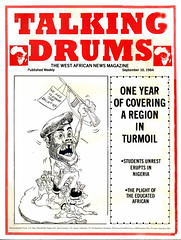Centre For Industrial Development Takes Stock
Markets Around Africa by Ben Mensah
Greater interest is being shown by most parties in increasing the use of to come. these services, although new joint ventures are only slowly coming into production due to specific development problems in countries with little industrial infrastructure and small markets.
Along the West Coast of Africa, from Cape Verde to Cameroon, the most important CID activity in the last year was to grant travel assistance to ten project sponsors to Europe for further negotiations with prospective European partners. Another eight project promoters were also invited to Europe to participate in promotion meetings.
CID also organized two regional antennae meetings: one for anglophone antennae held in Monrovia, Liberia in October and one for francophone antennae held in Dakar, Senegal in November 1983. These meetings provided an opportunity to review the existing collaboration between CID and its representatives in West Africa, as well as offering the chance for discussion and reaching an understand- ing on the role of the antennae, partic- Ghana. ularly in project identification and project follow-up.
CID carried out substantiations of potential industrial projects in some of the least developed countries in the region: Guinea Bissau, Cape Verde and Niger. These revealed CID's immediate and future intervention possibilities in these countries.
Furthermore, as a result of the participation of industrial promotion officers from Guinea, Conakry, Liberia, Mauritania, Nigeria and Senegal in the Promotion Attache Programmes organized during the year, CID has opened a brighter prospect for more project assistance requests in the years to come.
However, CID activities with West African Regional organizations such as CEAO, West African Economic Com- munity, the Mano River Union, and ECOWAS (Economic Community of West African States), were rather limited, except in the case of CEAO where CID collaborated with CEAO in the implementation or rehabilitation of the following national projects:
- biscuit plant in Upper Volta;
- soap-works in Mauritania;
- cardboard factory in Mauritania;
- tanneries to be set up or rehabilitated in Mali, Niger and Senegal;
- canning factory (foodstuffs) Burkina Faso (Upper Volta).
For instance, in spite of initial serious interest in a poultry and piggery project and the signature of a letter of intent and eventual agreement to undertake a feasibility study, the Danish partner, Intercool, suddenly withdrew on the grounds of its reservations on the profitability of the project.
In Nigeria the CID received a relatively large number of project proposals but in practically all cases, the request was for full foreign exchange financing of the projects. The huge Nigerian market offered a certain attraction to prospective investors yet the country's current foreign exchange constraints made it quite difficult for CID to get projects implemented.
Senegal is one of the countries that have received much assistance, particularly for promotion but also for training and expertise. Yet numerous Senegalese projects could not be implemented due to financial problems. These problems were partly due to the re-organisation of SOFIDESIT (Societe de Financement pour le Développement de L'Industrie et du Tourisme).
Like Senegal, Togo's problems are related to the dissolution of the two agencies, TOGOPROM and CNPPME in which deal with the promotion of projects. The situation has had a negative effect on projects under promotion but CID hopes that a solution will be found for the country's industrial promotion problems.
On a brighter note a new agency in Cameroon has signed a protocol of agreement to act as CID's antenna which during the second half of 1983, helped numerous sponsors to prepare project requests for submission to CID.
Mali has however been the most active country in terms of seeking CID assistance. CID's assistance to the mechanical and metallurgical sectors has been significant and is expected to have a valuable spin-off effect.
